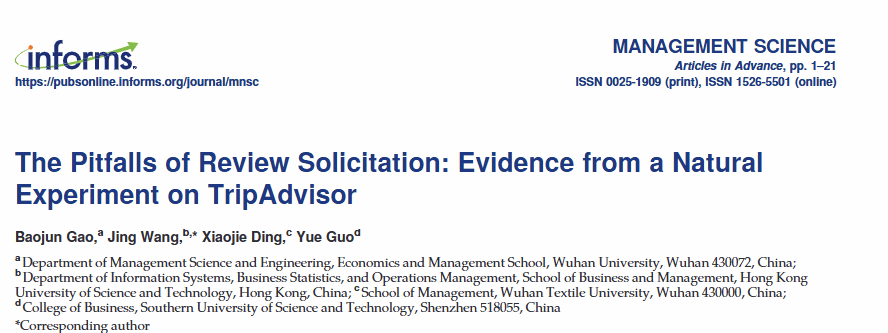Recently, Professor Gao Baojun has published online a paper titled "The Pitfalls of Review Solicitation: Evidence from a Natural Experiment on TripAdvisor" in Management Science (UTD24), a top business school journal worldwide. This paper was accomplished through the collaboration of Professor Gao Baojun, Associate Professor Jing Wang from the Hong Kong University of Science and Technology, Ding Xiaojie, a doctoral student of Professor Gao Baojun, and Associate Professor Guo Yue from Southern University of Science and Technology. Professor Gao Baojun is the first author.

In the digital era, user-generated reviews hold significant economic value. How to motivate users to create more and higher-quality reviews is crucial for platforms, enterprises, and consumers. To encourage user creation, TripAdvisor, the world's largest travel platform, launched a policy of collecting reviews in collaboration with hotels: hotels send emails inviting customers to write reviews, and the reviews are automatically posted on the platform. It can be anticipated that this policy would lead to a sharp increase in the volume of reviews and seemingly benefit both the platform and hotels. However, the article reveals the unforeseen negative consequences of this policy and offers a brand-new theoretical explanation, which holds significant practical implications for the formulation of platform incentive policies.
Based on a cross-platform difference-in-differences research design and massive data analysis, Gao Baojun's team discovered that after hotels implemented this plan, although the volume of reviews and ratings increased, an unexpected negative spillover effect occurred - the number of user-initiated reviews decreased by 15.5%. The reason lies in that this policy suppressed the creative motivation of high-quality old users. Further analysis shows that the content of invited reviews is relatively general and abstract, while the content of user-initiated reviews is specific and detailed. Therefore, the quality of the platform's content has also declined. This indicates that when platforms introduce governance policies such as user incentives, they need to carefully study their potential negative effects. Only in this way can the healthy development of the platform ecology be promoted.
Full text link: https://doi.org/10.1287/mnsc.2023.01006
 Faculty and Staff
Faculty and Staff Academics
Academics International Exchange
International Exchange







